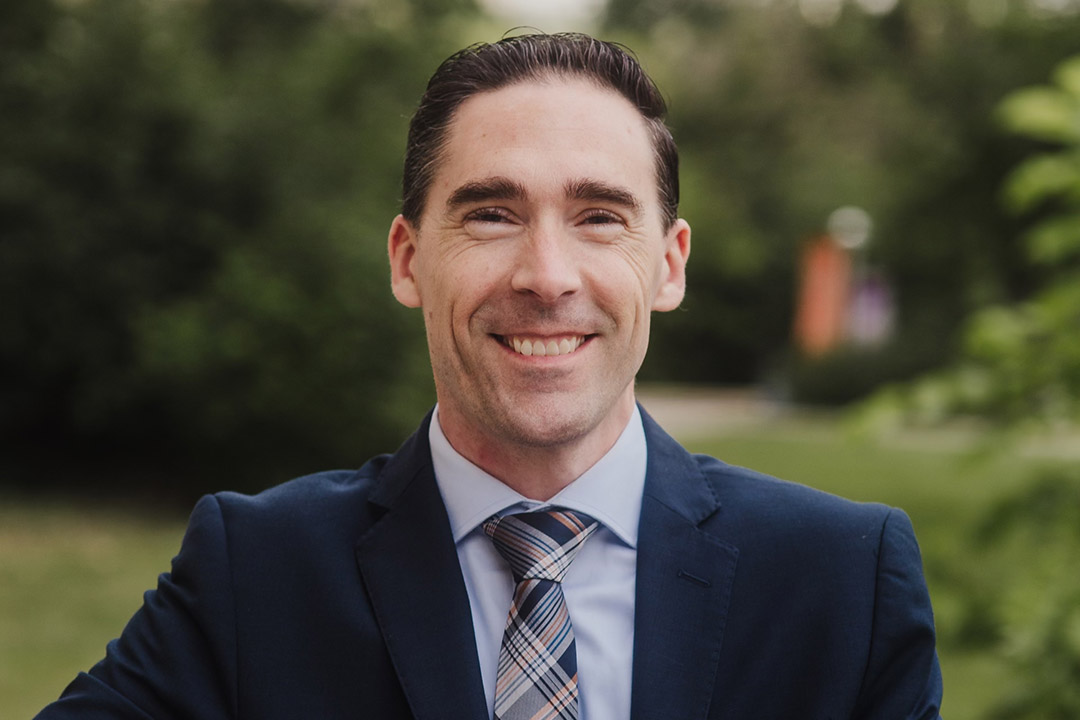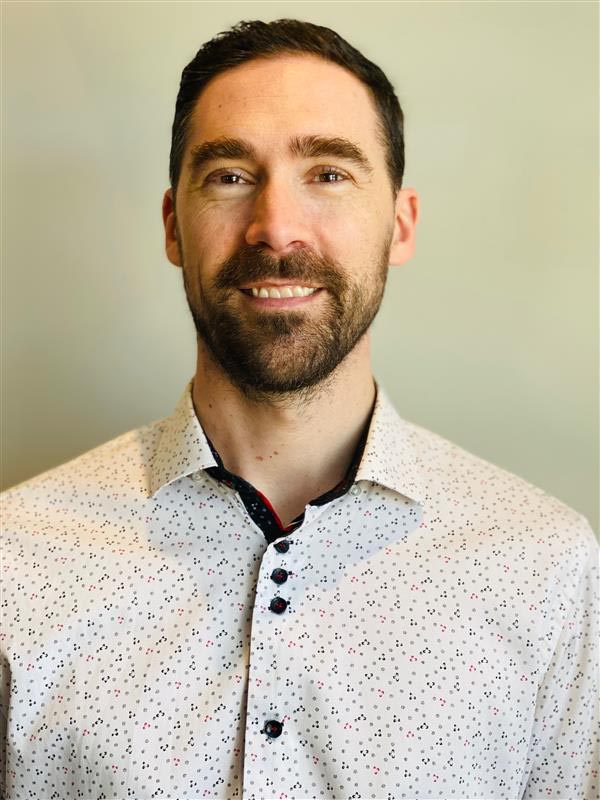
Mutual trust between teacher, student paramount to success
USask Distinguished Teacher Award winner honoured for the recognition.
By John GraingerDr. Greg Malin (BSc’99, MD’04, MEd’08, PhD’15) will be recognized at University of Saskatchewan (USask) Fall Convocation on November 13 as this year’s winner of the Distinguished Teacher Award.
Malin is an associate professor in the Department of Academic Family Medicine and the academic director for the undergraduate medical education program. Mallin was born and raised in Saskatoon, save for one formative year in Keliher, Sask. He received his medical degree from USask in 2004 and after recognizing a love for teaching and learning, he decided to pursue a master’s and PhD in education focusing on medical education.

He is married to Daria; has three children – Elle, Allister, and Jack; and a dog (Uma) and cat (Goober). Off campus, you might find him on the stage for local community musical theatre productions, on paddleboard on the river, or on a volleyball court.
Nominator Dr. Kent Stobart, (MD) vice-dean education and professor of pediatrics in the College of Medicine, said Malin’s unique teaching style sets him apart.
“Dr. Malin acts as the ‘guide on the side,’ rather than the ‘sage on the stage,’ by actively listening to them as they work, asking questions to guide them, and encouraging them to think and relate the question back to the key anatomy concepts, rather than simply giving them answers,” Stobart said. “Student learning is the priority in this approach because they actively engage in the learning process and he is present and accessible to the students during this application stage, which is typically more challenging.”
We talked to Malin about his journey.
This is an award that USask looks at most respectfully. How do you respond to being selected as a USask Distinguished Teacher?
I see it as a special honour. My understanding is that the award is selected by previous Distinguished Teacher Award recipients, who I know to be extraordinary educators, so in some ways it is hard to believe. Everything that I do at the university leads back to teaching or the educational process, and to know that others see that and value it, is quite reaffirming and humbling, especially when I think about how many excellent teachers and educators there are at USask.
What qualities do you see that a distinguished teacher should have at their disposal?
A deep passion for connecting with learners to help them to grow. A general kindness that allows students to express their ideas, opinions, their true selves. An ability to teach concepts at a level that students can understand and build on. A solid knowledge base in educational principles and a desire to continually expand and adapt that knowledge. A willingness to explore and try new teaching strategies. A growth mindset to support a comfort with failure, an eagerness to seek and accept feedback from multiple sources, and a desire to adapt. A certain amount of creativity, although sometimes the most effective approaches are the simplest ones.
Look back at the many teachers and professors you have learned from over the years. What did you take from them? Anyone in particular stand out to you either good or bad?
I have taken away little pieces from so many different teachers and instructors. From some, they were less dynamic or engaging, but I was so impressed with how well they knew their subject area and how they could present that information so clearly. From others, I learned about the value of engaging learners and the importance of enthusiasm to draw learners in. From others, I observed their approach to connecting with learners and how that could support learning. And from others, I learned about the importance of asking good questions, listening and being patient, and taking a step back to re-frame a question to make it more accessible, rather than going to an answer. The only thing that I would say was largely missing from my experience was active learning. During much of my undergraduate education, lecturing was almost exclusively used by my teachers. So, when I started to teach, I naturally adopted a lecture-based approach. But as I gained more comfort, reflected on my experience, and explored learning theories and principles, I understood the importance of active learning and worked to embed this in my teaching as much as possible. I also think that as teachers, we forget the teaching and learning process can be fun, so where possible I like to incorporate fun activities that support the learning.
You are a staunch advocate of the mentoring process. Why? What does that relationship bring to each other?
My area of educational scholarship is in self-determination theory (SDT) – a motivational theory – where I study the curricular structures and teacher actions that support or hinder student motivation. In SDT, there are three basic psychological needs that support motivation, growth and flourishing, and one of these is relatedness (the extent to which an individual feels a sense of belonging). When students feel a sense of connection, it fosters trust. When students feel that mutual trust, they are willing to express their ideas and opinions, and to be open to the learning process, even if it might mean being wrong because they know they will be supported unconditionally. One of the best ways to learn is to make mistakes and learn from them. A good relationship allows that to happen. In addition to this, when students feel safe to express themselves and their ideas, it opens me up to opportunities to learn from them.
How can you take this award and improve upon your own teacher qualities?
I would say that the award itself is not necessarily a driver for me to improve my teaching qualities. Learning, growing and improving is something that is part of who I am as a teacher and what to be as an educator. However, the process of providing information to the selection committee as part of my nomination has given me an opportunity to reflect on my teaching journey. I would say that an area that I would like to develop relates to universal design for learning and how I can ensure my teaching is more accessible to the diversity of learners I teach.
In your opinion, is there anything students are lacking that teachers/professors can help with?
I would say that there are probably more skills that I lack than students coming to me, but one area that comes to mind that students sometimes forget, especially with advances in technology to make things more and more efficient, is that learning is an effortful process. It does require time and work to happen, and we shouldn’t think that every step should be easy. But also, that if learning isn’t easy, that it must be bad or wrong. This is important for the learning process but also for well-being.
When did you know teaching was a route you’d like to take?
After medical school I was a teaching assistant in the medical school anatomy lab. My goals for that job were not related to supporting teaching, but more so because I liked anatomy, and it kept some options open to me. However, when I started engaging with students in the lab, and I was able to help them understand whatever we were learning in the lab at the time and have that “ah-ha moment,” whether really simple or complex, it was the most rewarding feeling I had ever experienced. It never gets old.
What does the future hold for Dr. Greg Malin? Where and what is your next goal?
My immediate future involves taking a year-long sabbatical leave where I have several educationally related projects that I plan to work on. After that, I plan to continue teaching anatomy, finding new ways to approach and advance my teaching. I plan to continue my program of research in self-determination theory and how it can support and enhance the medical education learning environment. I also enjoy working with faculty to support their teaching, so I would like to continue engaging in that. I have also engaged in educational leadership, and if there are opportunities that suit my skillset, then this is also an area where I would like to make a contribution.
Together, we will undertake the research the world needs. We invite you to join by supporting critical research at USask.

